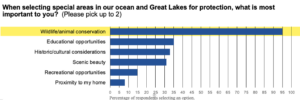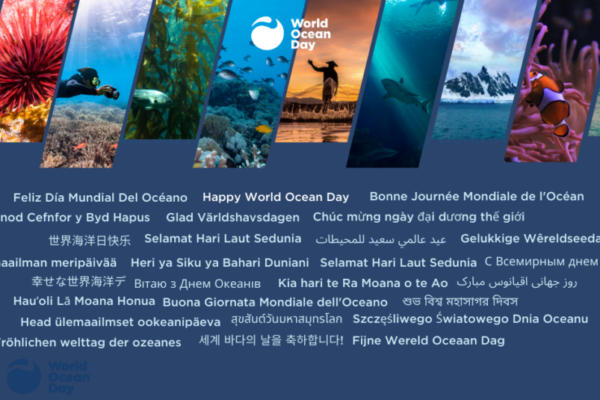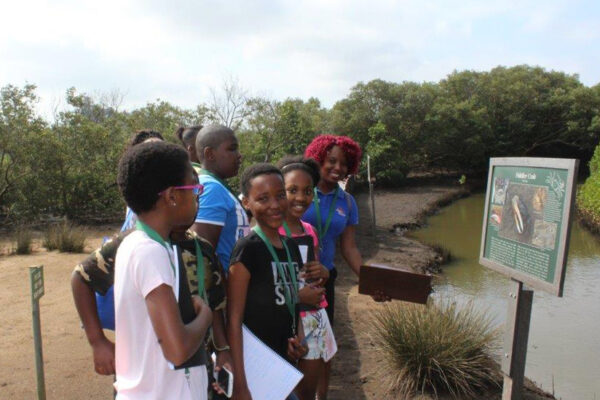Late last fall, The Ocean Project was pleased to receive an ocean messaging grant from Heartwired to Love the Ocean. This grant complements our current collaborative campaign initiative with support from the Gordon and Betty Moore Foundation that has allowed us to support zoos, aquariums, and museums over the last few years in getting more involved to effectively inform science-based federal fisheries policy and advance action for healthy sustainable marine ecosystems. This support enabled us to work in collaboration with the Aquarium Conservation Partnership (ACP), and field test the impact of the Heartwired messaging at four aquariums with an interest in advancing support for marine protected areas (MPAs) and a commitment to including and engaging diverse audiences.
Cutting to the chase, we found that the issue and approach resonated well across our different aquarium audiences, with the differences associated with age, gender, race/ethnicity or visit motivation few in number and small in size. With that in mind…
We are strongly encouraging our other aquarium and zoo partners to adopt this approach, as while the engagement is small the opportunity for impact is large, and this is especially true with the effort around and beyond World Oceans Day to grow the global movement to protect 30% of our blue planet by 2030.
As many of the aquariums noted in their scripts, only 7% of our ocean is currently part of an MPA; yet, scientists are telling us that we need to protect at least 30% of our planet, land and ocean, by the year 2030. Policymakers here in the United States, as well as around the world, are hearing this, and currently considering proposals to expand the size, number, and diversity of MPAs. But these decision-makers all too often hear only from the special interests who often oppose protection and assume that the broader public outside of a few activists is simply uninterested. This engagement shows that while the broader public may be unaware of MPAs, they are anything but uninterested. The only negative news? Due to the coronavirus crisis, we had to close our experiment as the aquariums had to close their doors.
So what did we do? Well, first of all, full credit where credit is due, as this was a team effort with the Aquarium of the Pacific, New England Aquarium, New York Aquarium, and Shedd Aquarium. Now here’s the step by step:
- We developed a common outline around raising awareness of MPAs, applying the redemption frame from Heartwired to Love the Ocean
- Each aquarium drafted a short script, approximately 90 seconds in length, to fit their specific settings and interests, though all came back to the idea of raising awareness
- The four aquariums delivered the messaging to a total of more than 13,500 (!) visitors while they were gathered in groups, noting that the messaging included an ask for a show of support for MPAs, such as signing a postcard or adding their name to a poster
- The aquariums then randomly surveyed more than 1,200 (!) visitors “slightly downstream” from where they had been engaged, and also collected staff feedback
- Here at The Ocean Project we analyzed the overall results, and then checked carefully for any differences associated with age, gender, race/ethnicity, or visit motivation, with the latter based on the different ocean mindsets identified in the Heartwired report.
In those surveys, we found strong support for our incoming hypothesis that the majority of visitors, even those who go to shows and talks, are not yet familiar with MPAs, but after hearing the messaging would express both high awareness and strong support for the concept. In fact, 94% of those who reported being present for the messaging recalled learning about MPAs. And those who reported being present for the messaging and learning about MPAs were in turn much more likely than the other visitors to strongly support MPAs. What is almost unbelievable to us was the strength of that support among the group that received the messaging, as unlike other ocean issues, we found no evidence of a political division or opposition group. Instead we found nearly unanimous agreement that they individually support, and also want aquariums and zoos to support the protection of special places in our ocean and Great Lakes.

Another highlight to us was that across the reasons a respondent could cite as the motivation for their visit, it was quite clear that at least in an aquarium context their concerns were centered on the animals, wanting to provide the animals with a safe home in the ocean. So while aquariums and zoos certainly can bring up the other benefits, a reminder that with reports of short attention spans, we would suggest a sharp focus over the 90 seconds on what MPAs can do for ocean animals.

And yet again we found that receipt of the messaging correlates strongly with positive opinions about aquariums and higher Net Promoter Scores. Whether on social media over the coming weeks, or in person upon reopening, we see no downside, and in fact a strong upside, to including this messaging around MPAs and asking visitors to express a show of support. For more on how to do so starting with World Oceans Day, click here.




